Hands on deck
Ask Aravind Madabhushi what he enjoys most about Medicine, and the Year 4 NUS Medicine student would answer without hesitation: “Clinical practice.” He elaborates: “Much as I enjoy reading research papers, I really prefer surgery and hands-on work. Surgeons like to call it “instant gratification”, but there is admittedly a rush of satisfaction in seeing tangible results when we fix a problem and better the patient’s life there and then, compared to a longitudinal follow-up.” Priding himself on efficiency, the 24-year-old shares that he enjoys seeing results congruent with his efforts within a tighter time frame.
Crossing paths late
Contrary to expectations, Aravind did not know the path he wanted to pursue early on in life. His interest in Medicine was piqued only after National Service (NS) when some of his close friends chose to defer their enlistment and enrolled in medical school ahead of him. He concedes with a smile: “Medicine and I crossed paths fairly late. I decided to try to secure a shadowing attachment at a hospital after my NS to see whether I would resonate with the work. Then Covid hit our shores, and things took an unexpected swerve.”
The pandemic made a hospital shadowing attachment a virtual mission impossible, but what became possible - after much manoeuvring - was a full-time customer service job in the Business Office of a hospital, where Aravind eventually got assigned responsibilities such as submitting insurance and billing claims for the patients. “Trying to work out payment options with insurance companies for financially-challenged patients made me realise I could help people at a vulnerable stage of life - not just clinically,” he recounts. That hospital stint also cemented his desire to pursue Medicine at NUS.
Of warm bodies and ‘silent’ mentors
Despite the heavy and intensive workload in Medicine, Aravind takes comfort in the strong support network in the medical fraternity as seniors undertake to mentor and guide their juniors. “Our seniors would prepare lectures and tutorials for us juniors. The Year 5 seniors would conduct monthly lessons with us, increasing in frequency as our exams drew near,” he offers. Deeply touched by the warm support, it has spurred Aravind to do the same by mentoring his own juniors when he was in Year 2.
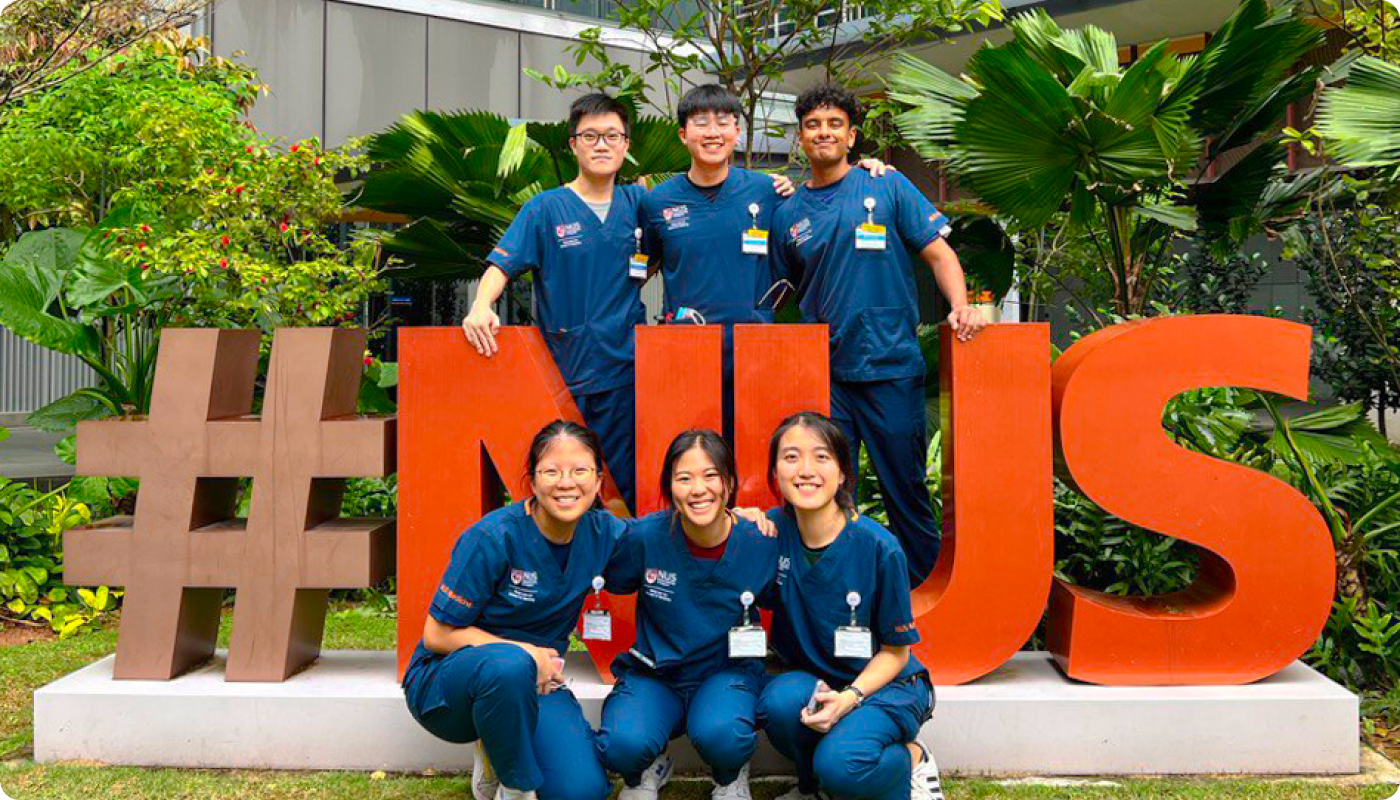
With Aravind’s Clinical Group — the incredible people who are by his side every day, sharing the highs, challenges, and laughter that come with this journey.
Aravind counts Collaborative Learning Cases (CLC), simulator sessions and anatomy courses as some of the most memorable and interesting lessons in his years in NUS Medicine. He shares: “In our pre-clinical years, we would have CLC group work (MD1140: Foundation of Body Systems in Health and Disease I, and MD2140: Body Systems in Health and Disease II) where we engaged in collaborative problem-solving. It was not only interactive and fun, but allowed us to learn from one another and broaden our perspectives.”
On the other hand, simulator sessions allowed them to have hands-on practice that built their confidence in executing medical procedures such as intubation or blood-taking. “Of course, we can’t forget our anatomy classes in Year 1 where we got to learn directly from cadavers - our ‘silent’ mentors - which are bodies donated to science for dissection,” he smiles.
Aravind also had the opportunity in Year 1 and 2 to work with other healthcare students from Medicine, Nursing, and Pharmacy in a unique NUS programme called the Longitudinal Patient Experience (LPE) - which has been updated and integrated into the latest, more expansive NUS Common Curriculum for Healthcare Professional Education since 2023. The exposure to interdisciplinary collaboration – as the team followed a patient’s journey from diagnosis, treatment, to follow-up care – proved invaluable, and gave Aravind a better understanding of working together effectively in Singapore’s healthcare system, and fostered a deeper appreciation for the diverse roles and contributions of other healthcare professionals.
A longer view of things
To those considering Medicine, Aravind suggests taking a long view of things. “You need to know what you are getting yourself into. Do your research and talk to medical professionals who are at different stages of their careers to gain a range of perspectives. After all, you will be in medical practice for the long haul. If you can see yourself thriving at every stage, you don’t have to be afraid of pursuing Medicine,” he reasons.
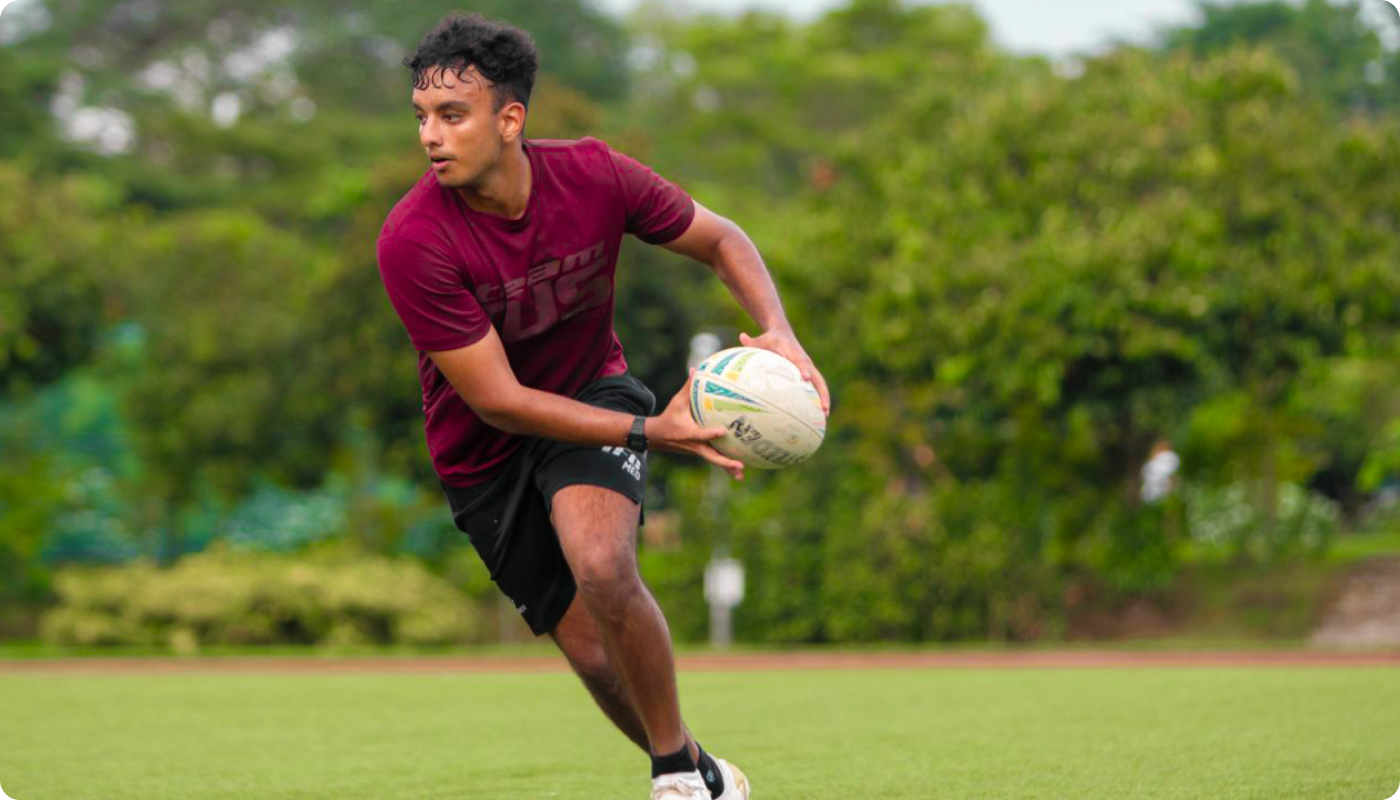
Aravind in action at the 2022 IFG Medicine Trug, playing the middle position with energy and skill!
He cautions that a key challenge faced by junior doctors is being pushed to the limits in long working hours. “You need to be prepared to perform despite the crucible of pressure or strenuous environments,” he asserts. To ensure he doesn’t burn out, Aravind decompresses by enjoying his me-time, hanging out with fellow Med School friends, and playing more sports. “Since my NUS days, I started enjoying more types of sports, playing contact rugby for NUS Rugby for the past two years, as well as touch rugby for Eusoff Hall concurrently. This year, I have also picked up a new sport - tennis!” he enthuses.
A position to give back
Citing his parents as the biggest influence on his life, Aravind considers family his top priority and credits his mother for his bent towards volunteerism. In fact, it was his mum who rallied the whole family during the pandemic to volunteer at an non-profit organisation called It's Raining Raincoats to provide useful items and organise activities for the migrant worker community in Singapore. “My mum imparted to me the value of empathy, and modelled what it meant to help others, and to express love and affection for the people around us,” he recounts.
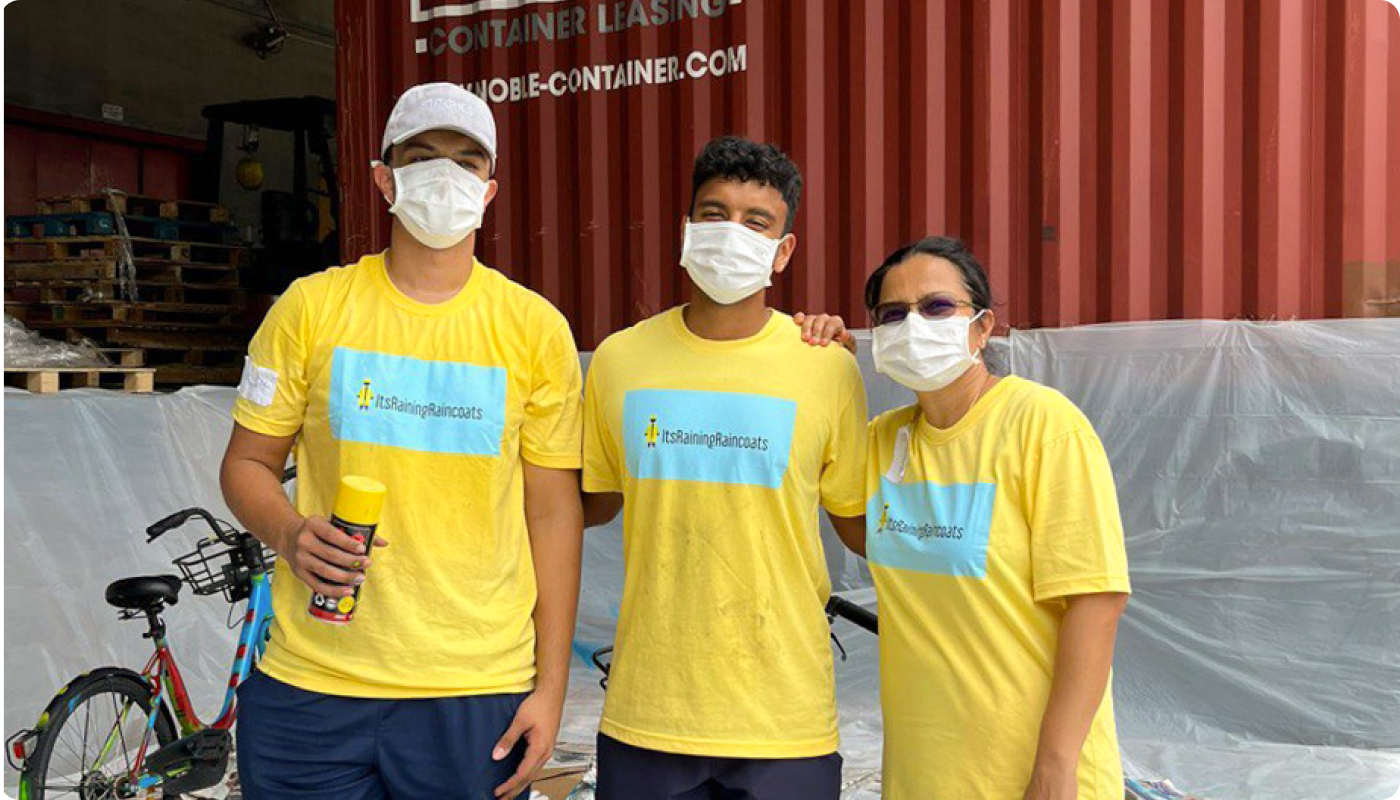
Aravind (middle) with younger brother, Anirudh (left) and Mom Anu (right) where they took in discarded bikes from the bike rental companies and repainted them so that migrant workers could use the bikes to get around.
In retrospect, Aravind felt that it was upon entering University that his purpose in volunteering really solidified and his volunteering became more intentional. Whilst volunteering was more of a Co-Curricular Activity in his secondary school days, it was his National Service experience that put things into perspective for Aravind and made him realise how fortunate he was. He shares: “Volunteering has helped me understand how lucky I am, the opportunities I have been able to build on, and spurred me to give back. The meeting of like-minded fellow volunteers at NUS also helped me mature in my journey as we share our ideas and experiences.”
The sign of being heard
Aravind also instructs fellow healthcare students on the basics of sign language as an instructor in Project SIGNapse. Run by a group of NUS students from Medicine, Nursing, Pharmacy, Social work, and Psychology, he took up the 3-month course alongside some of his peers who also thought it would be a good skill to learn for patient interaction. They subsequently decided to pay it forward and become instructors themselves.
“I first encountered sign language while working at a restaurant, where I witnessed a deaf customer struggling to communicate his request. My manager stepped in and signed to him, and it was heartwarming to see the customer's smile when he felt understood. Inspired by that moment, I wanted to do the same for others,” he shares.
Uplifting the community
As the Project Director and Secretary-Treasurer of Camp Simba, Aravind has helped to helm the 2022 and 2023 editions of this annual 3D2N children’s camp – jointly organised by NUS, NTU & Duke-NUS medical students – for kids whose family members have been affected by cancer. He reflects: “Organising the first camp in the aftermath of the pandemic after the restrictions were lifted was challenging, but it also meant we could hold an overnight camp which led to greater participant reflections. The post-camp interviews by both participants and parents were very positive. It really heartens me that the facilitators and kids would continue to keep in touch beyond the camp, and many kids became good friends subsequently.”
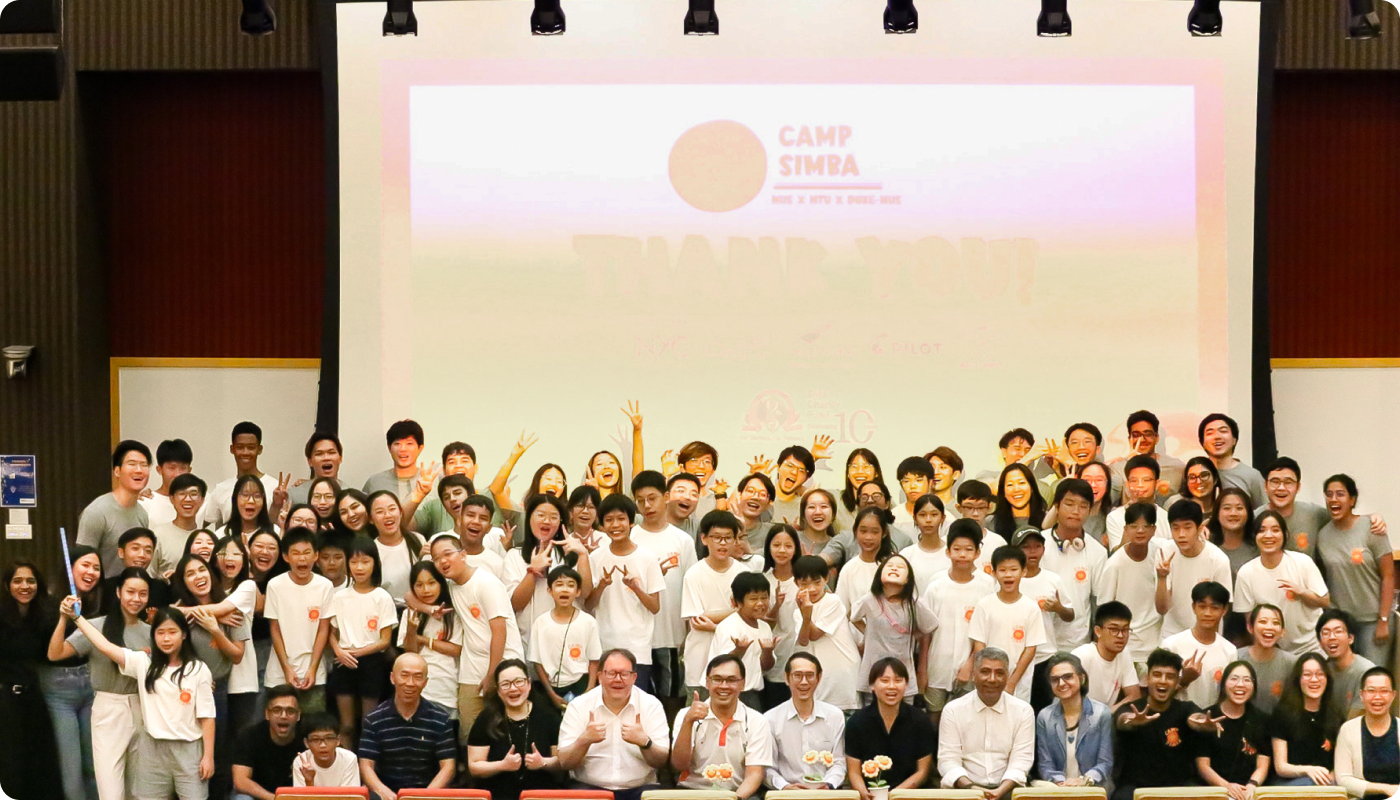
Aravind (first row, fourth from right) with camp participants and his Camp Simba 2024 committee members.
Giving more to the world
In 2023, the President of the 75th NUS Medical Society Executive Committee also led a team of 40 Year 1 and 2 Medical students on Project Sa’Bai, an overseas CCA medical volunteering trip, organising four health screenings for villagers and rural school children in Phnom Penh, Cambodia.
Reflecting on the most sobering lesson learnt, Aravind offers: “Growing up in Singapore, we have taken our healthcare system for granted, yet in countries like Cambodia the barriers to healthcare access are real. It is not uncommon for our referral cases to turn down medical care because of financial constraints. That is heartbreaking to witness, especially for young children.” Having enjoyed a very happy childhood himself, Aravind feels strongly that kids should not have to suffer from poor health due to lack of healthcare access.

Aravind sharing smiles and laughter with fellow team mates from Project Sa’Bai and kids in Phnom Penh, Cambodia, as they play ball together.
The whole of your wellbeing
Aravind’s various medical volunteering experiences have also underscored the importance of human-centric patient care to the empathetic medical student. He muses: “Just because two patients have the same medical condition doesn’t mean they can be treated the same way. It strengthens my resolve to treat each patient as a unique person when I become a doctor. We need to know them, understand their goals and needs, and how they wish to become better. Everyone is different, and ultimately Medicine is not just about improving the human body, but their entire wellbeing.”
After his fourth year, Aravind has tentative plans to spend three weeks in Vietnam for his overseas hospital attachment in the hopes of gaining more clinical exposure and the valuable experience of working in a different country. “I hope this will broaden my perspective and I can eventually bring back good clinical practices to Singapore after learning from my fellow healthcare professionals overseas,” he shares.
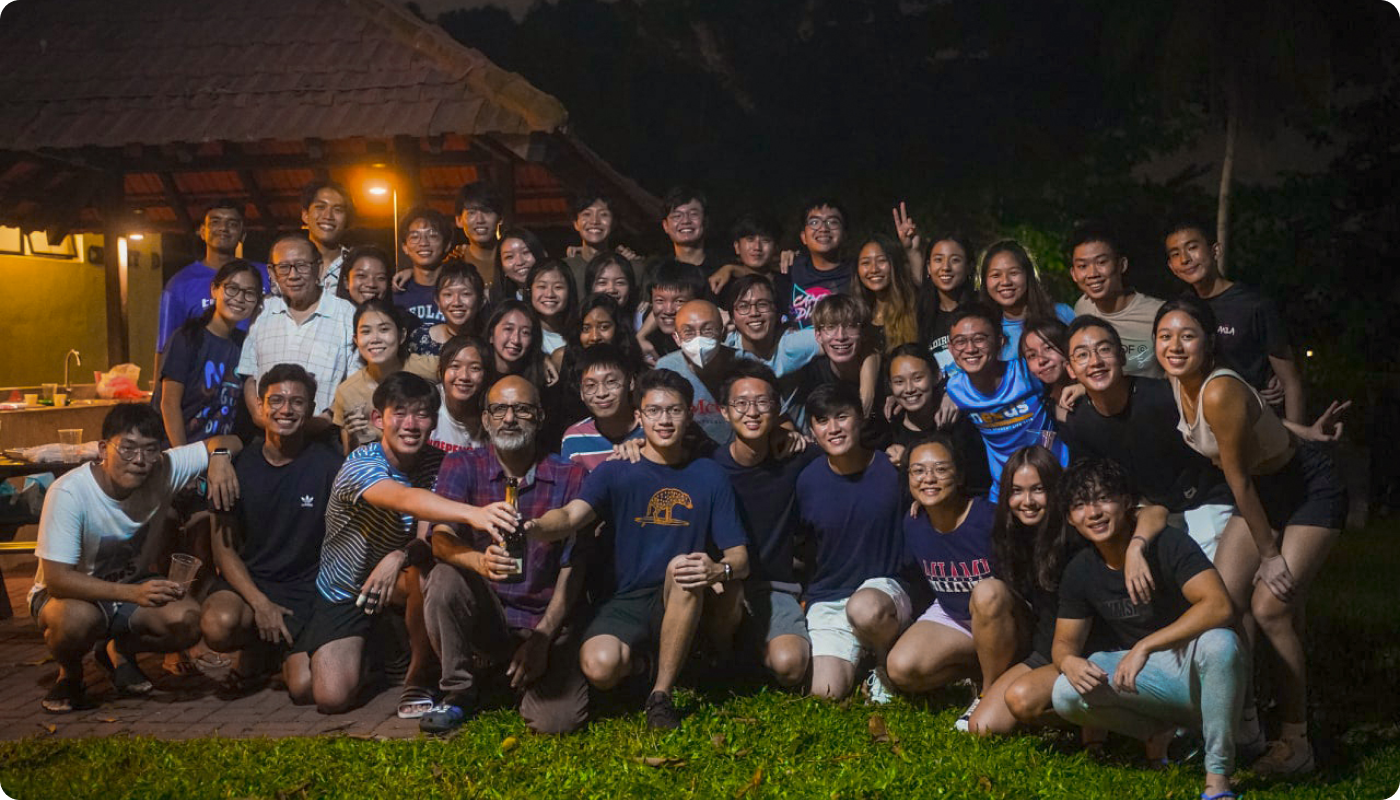
As NUS Medicine House Captain, Aravind (back row, first from left) organised a house-wide chalet event with over 50 attendees including students across all years, House Master Mentor Professor Low Cheng Hock (third row, second from left), Professor Satish L Ramapatna (first row, fourth from left), Adjust Associate Professor Dr Derrick Lian (second row, fifth from left).